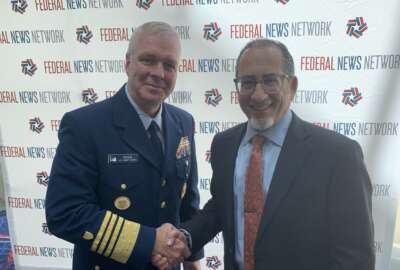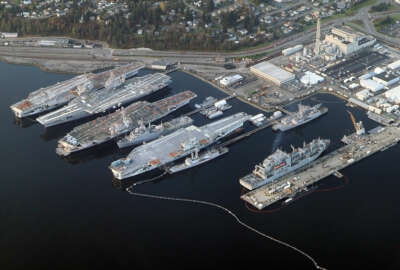The Coast Guard needs to better protect its own emergency responders
The Coast Guard is famous for its field units up-and-down the coasts. They're the ones who launch search-and-rescue missions when fishing boats capsize or canoes...
The Coast Guard is famous for its field units up-and-down the coasts. They’re the ones who launch search-and-rescue missions when fishing boats capsize or canoes drift into shipping lanes. But the Government Accountability Office (GAO) report has found the field units often don’t have emergency food and water for themselves. For more on this, Federal Drive with Tom Temin spoke with Heather MacLeod, GAO’s Director of Homeland Security and Justice Issues. (GAO REPORT HERE)
Interview Transcript:
Tom Temin And you looked at just to be clear, this is not food and water for people that are rescued, but food and water for the rescue crews themselves who live or at least work for long shifts in harm’s way potentially.
Heather MacLeod Indeed, this is Coast Guard personnel themselves. And we looked at some of the more remote Coast Guard stations to determine the adequacy of their emergency supplies for themselves.
Tom Temin And where are some of the remote ones? I mean, you think of them like in, you know, Rehoboth Beach, where you can get off and have some fries down the boardwalk. But this is some areas that might be a little bit more austere.
Heather MacLeod Yes. These can be really small beach towns. They can be remote stations in Alaska, Florida, Oregon, really across the country.
Tom Temin And what prompted this query that seems like a very arcane topic, whether field units of the Coast Guard can, you know, take care of themselves in an emergency.
Heather MacLeod Yeah, well, we actually did a report last year looking at Coast Guard preparedness for tsunami evacuation in the Pacific Northwest. So this is mainly the Washington, Oregon inundation zone. And through our work in that area, we saw that the Coast Guard personnel might not be prepared for emergencies themselves. Congress followed up and asked us to look at this issue more specifically. So we did this study. It was a quick study, but we found the issues pretty readily.
Tom Temin How many field stations does the Coast Guard have? Do we know?
Heather MacLeod I can’t say off the top of my head, but they are located across the country and these can be a range of stations from a handful of people to dozens of people.
Tom Temin Sure. And across the nations is accurate because there are inland waterways where the Coast Guard operates also. Correct?
Heather MacLeod For sure. For sure. The Great Lakes being a great example of that.
Tom Temin And does the Coast Guard have a policy over what should be stored and stowed for those field personnel?
Heather MacLeod So while they have a policy, we found that the policy is actually unclear to the stations and the Coast Guard personnel. And that and the reason for that is just the interpretation of it. Can we buy emergency supplies for ourselves? Can we hold water in our facilities in case of emergencies? It’s actually something that we see federal government-wide. There’s some questions around procurement on these issues. But basically, we saw a range of sort of understanding of the policy.
Tom Temin Yeah, I remember a lot of organizations kind of thought about storing in supplies in the aftermath of 911 when people were trapped, you know, for a while or some sort of a disaster they thought could keep people in riots and so on. So the policy is unclear then whether they should have this.
Heather MacLeod Right, and most units that we talked to did not have emergency supplies. Some of the areas, you know, where you would expect perhaps where there’s more frequent hurricanes or events like that, that the personnel do have those supplies and have looked into it. But other stations that don’t have these no notice events very frequently just didn’t have supplies.
Tom Temin Just to make it explicit. Then the danger here is that people in the water dangling from a helicopter operating a boat to rescue people themselves could be hungry and thirsty.
Heather MacLeod Yeah, it’s a case where the Coast Guard personnel themselves become the victims of, you know, a natural disaster, manmade disaster, other kind of event like that.
Tom Temin We’re speaking with Heather MacLeod. She’s director of homeland security and justice issues at the Government Accountability Office. And so you did a survey. Tell us who you asked and what you found out. Yeah.
Heather MacLeod So we reached out to some of the more remote stations, 32 interviewed and conducted a survey and just asking them what supplies they had on hand, whether they thought they could have supplies on hand, how they would purchase supplies, whether they talked about having supplies. And we’re able to gather some really great information. A lot of individuals that are in charge of procurement. We found didn’t know about the procurement policies, thought that having emergency supplies were prohibited or just didn’t know. And this all relates back to unclear policies.
Tom Temin Because in the report there is a picture of one location that has stacks of I don’t know what’s in them, but looked like buckets, plastic buckets. And next to that are pallet loads of bottled water. So that place clearly has one view of the policy. But some places have nothing.
Heather MacLeod Absolutely. Some places have nothing. And some places honestly don’t have the amount of space that it requires. You know, this photo was taken in a place that actually has the room to have those supplies, and they did proceed to acquire them.
Tom Temin Right. So the stations vary physically. Some of them might be just like a little hut somewhere type of thing with a boat docked outside. Some might be a warehouse type of operation.
Heather MacLeod For sure. For sure.
Tom Temin And did you visit any of them? Sometimes GAO staff visits those places in person. Did your folks go to any of them?
Heather MacLeod We do get out into a number of Coast Guard facilities, and yes, we did on this one as well.
Tom Temin And did you find them? Maybe this is outside the scope of the report, but were they in generally good repair even if they were cramped in some cases?
Heather MacLeod Well, the Coast Guard infrastructure is an ongoing issue for the Coast Guard. We’ve noted in the past that there’s a $2.6 billion backlog on Coast Guard infrastructure facilities. This includes these small boat stations, docks, everything on that side. The Coast Guard is trying to make some progress in updating their infrastructure, but there is a huge and ongoing backlog related to these stations.
Tom Temin Okay. Well, getting back to the food and water issue, then, you made some recommendations and what were they? And I’m assuming they’re predicated on the idea that whatever the policy is or however vague it might be, you feel that the Coast Guard field stations should have emergency food and water stored in there.
Heather MacLeod Absolutely. And the good news is that the Coast Guard does have policies and that from our perspective, if they updated these policies to clarify them and then disseminated them out to the Coast Guard stations in the field, that would really help in this area. And that was the basis of two of our recommendations that they update and clarify their policies related to emergency supplies, update their policies related to procurement, as well as they conduct assessments of the risk around these events that might cause them to need these supplies. So the Coast Guard agreed with all of our recommendations and provided us some timelines to implement them, including by next year. This time next year, they plan to update their policies and conduct the assessments. And then the procurement policy is going to take a little bit longer, but just a couple of years out.
Tom Temin Yes, because there has to be money for this in there, even though it might be a small amount of money per station. When you add up all the field units, it’s some real dollars then possibly for sure. And the material has to be rotated. I mean, if you don’t use the food in 18 months or something, you probably have to replace it. Yes. Okay. Well, let’s hope they listen here.
Copyright © 2025 Federal News Network. All rights reserved. This website is not intended for users located within the European Economic Area.
Michele Sandiford is a digital editor at Federal News Network.






